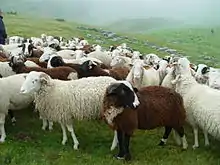flock
English
Etymology 1
From Middle English flock (“flock”), from Old English flocc (“flock, company, troop”), from Proto-Germanic *flukkaz, *flakka- (“crowd, troop”). Cognate with Middle Low German vlocke (“crowd, flock”), Old Norse flokkr (“crowd, troop, band, flock”). Perhaps related to Old English folc (“crowd, troop, band”). More at folk.
Noun

flock (plural flocks)
- A large number of birds, especially those gathered together for the purpose of migration.
- A large number of animals, especially sheep or goats kept together.
- Those served by a particular pastor or shepherd.
- Tennyson
- As half amazed, half frighted all his flock.
- Tennyson
- A large number of people.
- Bible, 2 Macc. xiv. 14
- The heathen […] came to Nicanor by flocks.
- Synonym: congregation
- Bible, 2 Macc. xiv. 14
- (Christianity) A religious congregation.
- Synonym: congregation
Synonyms
(large number of people):
Translations
|
|
|
|
- The translations below need to be checked and inserted above into the appropriate translation tables, removing any numbers. Numbers do not necessarily match those in definitions. See instructions at Wiktionary:Entry layout#Translations.
Verb
flock (third-person singular simple present flocks, present participle flocking, simple past and past participle flocked)
- (intransitive) To congregate in or head towards a place in large numbers.
- People flocked to the cinema to see the new film.
- Dryden
- Friends daily flock.
- (transitive, obsolete) To flock to; to crowd.
- 1609, Taylor
- Good fellows, trooping, flocked me so.
- 1609, Taylor
- To treat a pool with chemicals to remove suspended particles.
Translations
|
|
Etymology 2
From Middle English flok (“tuft of wool”), from Old French floc (“tuft of wool”), from Late Latin floccus (“tuft of wool”), probably from Frankish *flokko (“down, wool, flock”), from Proto-Germanic *flukkōn-, *flukkan-, *fluksōn- (“down, flock”), from Proto-Indo-European *plewk- (“hair, fibres, tuft”). Cognate with Old High German flocko (“down”), Middle Dutch vlocke (“flock”), Norwegian dialectal flugsa (“snowflake”). Non-Germanic cognates include Albanian flokë (“hair”).
Noun
flock (countable and uncountable, plural flocks)
- Coarse tufts of wool or cotton used in bedding
- A lock of wool or hair.
- William Shakespeare (c.1564–1616)
- I prythee, Tom, beat Cut's saddle, put a few flocks in the point [pommel].
- William Shakespeare (c.1564–1616)
- Very fine sifted woollen refuse, especially that from shearing the nap of cloths, formerly used as a coating for wallpaper to give it a velvety or clothlike appearance; also, the dust of vegetable fibre used for a similar purpose.
- 1913, Mrs. [Marie] Belloc Lowndes, chapter II, in The Lodger, London: Methuen, OCLC 7780546; republished in Novels of Mystery: The Lodger; The Story of Ivy; What Really Happened, New York, N.Y.: Longmans, Green and Co., 55 Fifth Avenue, [1933], OCLC 2666860, page 0091:
- There was a neat hat-and-umbrella stand, and the stranger's weary feet fell soft on a good, serviceable dark-red drugget, which matched in colour the flock-paper on the walls.
-
Translations
Verb
flock (third-person singular simple present flocks, present participle flocking, simple past and past participle flocked)
- (transitive) To coat a surface with dense fibers or particles.
Translations
|
Derived terms
See also
- Appendix:English collective nouns
Swedish
Etymology
From Old Swedish flokker, flukker, from Old Norse flokkr, from Proto-Germanic *flukkaz. Cognate with Faroese flokkur, Icelandic flokkur, Norwegian flokk, and Danish flok.
Pronunciation
audio (file)
Declension
| Declension of flock | ||||
|---|---|---|---|---|
| Singular | Plural | |||
| Indefinite | Definite | Indefinite | Definite | |
| Nominative | flock | flocken | flockar | flockarna |
| Genitive | flocks | flockens | flockars | flockarnas |